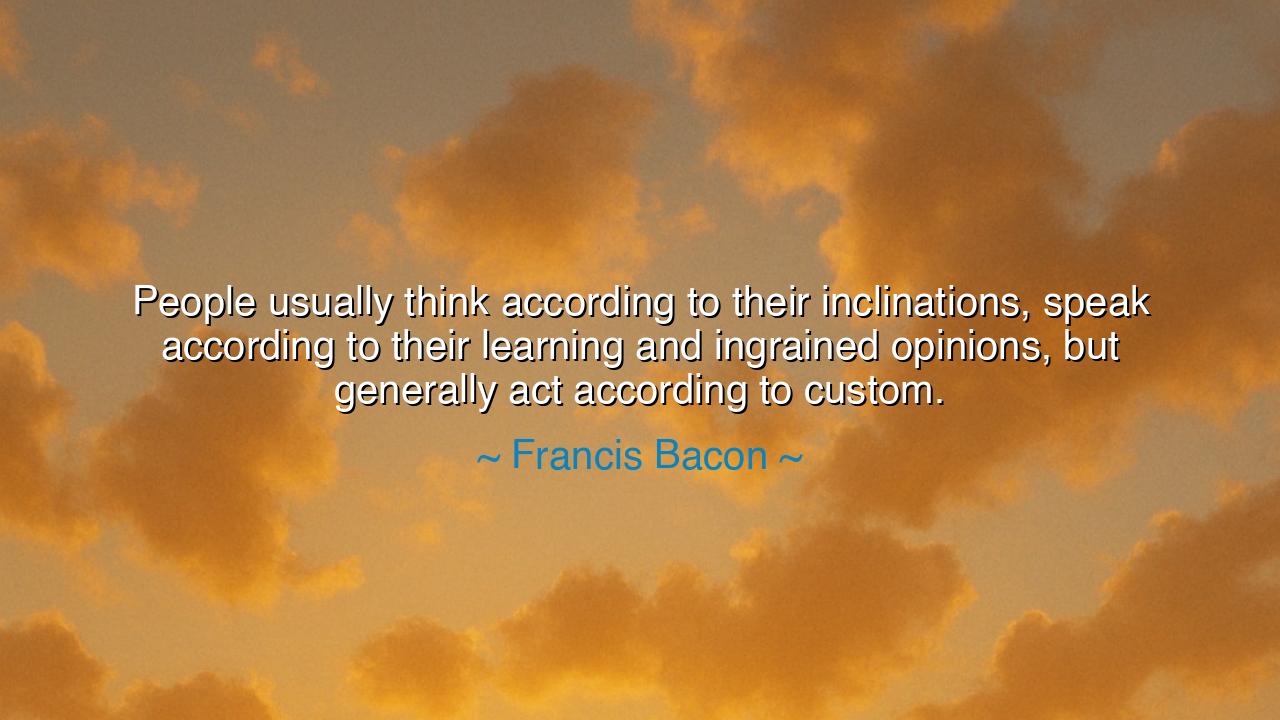
People usually think according to their inclinations, speak
People usually think according to their inclinations, speak according to their learning and ingrained opinions, but generally act according to custom.






The wisdom of Francis Bacon, one of the great minds of the Renaissance, pierces deeply into the heart of human nature when he declares: “People usually think according to their inclinations, speak according to their learning and ingrained opinions, but generally act according to custom.” In this reflection lies a truth as old as civilization itself — that men are creatures of habit, bound by invisible chains of thought and tradition. Bacon, the father of modern philosophy, did not merely study knowledge; he studied how people use it — and how rarely they rise above the forces that shape them. His words remind us that while intellect may soar, behavior often kneels before the altar of convention.
The meaning of this saying rests in its threefold division of the human spirit: the mind that thinks, the tongue that speaks, and the body that acts. We think according to our inclinations — that is, we are swayed not by reason but by desire, not by truth but by what pleases our inner leanings. We speak according to learning and opinion, drawing from the limited well of what we have been taught or believe to be true. But when it comes to action, we bow to custom — to the habits and social patterns that rule the world more powerfully than laws or logic. Thus, man’s highest faculty, reason, is often subdued by his comfort with what is familiar. It is easier to follow the crowd than to confront the truth.
Bacon himself lived in an age where blind custom held nations in its grip. The Church resisted new science; the nobility clung to inherited power; and scholars worshipped ancient authority instead of seeking new light. Yet Bacon, defying these traditions, became one of the first to demand empirical reasoning — the testing of truth through observation and experiment. He saw how men, even the learned, preferred the safety of accepted belief to the labor of discovery. His words were not a criticism born of disdain, but a call to courage — a plea that mankind awaken from the slumber of routine thought and dare to question its own nature.
Consider the story of Galileo Galilei, a man who lived by Bacon’s philosophy even before it was written. Galileo thought according to reason, spoke according to knowledge, but acted against custom — and for this, he was condemned. His telescope revealed truths that shattered centuries of belief, yet most men, bound by habit, refused to see. They preferred the comfort of old order to the pain of new understanding. In him we see both the triumph and tragedy of the thinker who breaks free from Bacon’s triad — who dares to live by truth rather than inclination or tradition.
Bacon’s insight also unveils a paradox within every soul: the distance between what we know and what we do. The wise man may understand the value of virtue, yet still fall to vice out of habit. The scholar may speak eloquently of justice, yet conform to corruption because everyone else does. It is not ignorance that enslaves humanity, but the quiet, unthinking obedience to custom — to what everyone does, what everyone says, what everyone believes. The hardest battle, then, is not to acquire wisdom, but to live it against the tide.
In this way, Bacon’s teaching is a mirror to every generation. We think we are free because our thoughts are modern, yet our actions remain chained to convenience, imitation, and fear of difference. The challenge he gives us is not merely intellectual — it is moral. To act rightly requires more than knowledge; it requires the strength to break from custom when custom is wrong. It is not enough to think differently or speak wisely — one must also live consciously.
Let this truth be a torch for the seekers of wisdom: examine not only your thoughts and words, but your habits. Ask yourself whether your actions are born from conviction or from the comfort of imitation. Strive to align the three — to think with clarity, speak with honesty, and act with courage. For only when a person’s thought, speech, and action become one in truth does he rise above the ordinary and walk the path of mastery. The rest will remain, as Bacon foresaw — slaves to inclination, parrots of opinion, and prisoners of custom.






AAdministratorAdministrator
Welcome, honored guests. Please leave a comment, we will respond soon